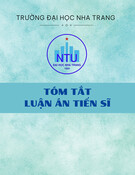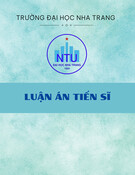
2
characteristics, namely perceived service value, purpose in life,
absorptive capacity, and grit. While predominantly capturing the
impact of external factors (parents, teachers, friends, colleges, etc.) or
student perception of external factors (motives, learning missions,
familiarity, etc.) on engagement decision, previous studies scarcely
consider different factors of personal characteristics. Also detected by
the author is the fact that several consequences of student engagement,
as documented in most literature, are academic achievement, school
dropouts, and student satisfaction, whereas happiness, or quality of
school life, has not specifically been considered. In this regard, this
thesis investigates the topic of student engagement on the basis of the
mentioned gap.
1.3. Research objectives
The overall objectives of the research are to unveil: (i) how
cognitive dimensions and personal characteristics (including perceived
service value, absorptive capacity, purpose in life, and grit) affect
student engagement; and (ii) the linkage between student engagement
and quality of college life.
1.4. Research questions
How can cognitive dimensions and personal characteristics be
measured and to which extent do they impact student engagement?
Besides independent variables, which factors will be explored with
their moderating role?
How does student engagement affect quality of college life?
Among the four cognitive dimensions and personal characteristics,
which has an effect on quality of college life?
Is there any difference in quality of college life between
students of different gender and geographical locations?































